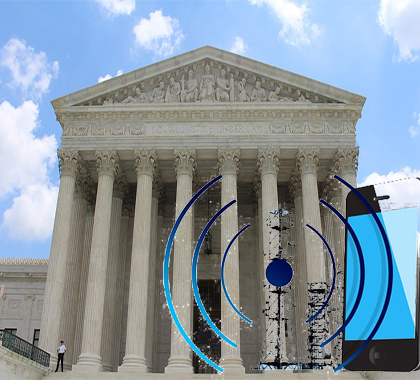A case scheduled for consideration by the U.S. Supreme Court (SCOTUS) in its 2017 term, beginning in October, will determine whether law enforcement investigators must obtain a search warrant before demanding user location data from mobile phone companies.
The Court agreed on June 5 to consider Carpenter v. United States, on appeal from the U.S. Court of Appeals for the Sixth Circuit, challenging whether the Fourth Amendment permits law enforcement agencies to seize historical cell-site location information (CSLI) from mobile phone companies without first obtaining a warrant from a judge.
CSLI documents the phone towers a mobile phone has connected to and at what times. It can be used to track where a person has been.
Lawyers representing federal law enforcement agencies claim the government is not required to obtain a warrant for obtaining CSLI.
‘Old Bits of Jurisprudence’
Adam Bates, a policy analyst with the Cato Institute’s Project on Criminal Justice, says the government’s warrantless CSLI collection relies on two legal concepts.
“There are two decades-old bits of jurisprudence that the government uses to justify the warrantless collection of cell phone data,” Bates said. “One is the ‘reasonable expectation of privacy’ test, from a 1967 case called Katz. The basic idea is that the Fourth Amendment is only implicated when the government violates an individual’s ‘reasonable expectation’ that a given communication will be private.
“The other doctrine is called the ‘third party doctrine,’ and it says that any communications that you voluntarily disclose to third parties lose their expectation of privacy,” Bates said. “In other words, if I have something I want to tell you, and you’re standing across a crowded street when I yell it at you, the fact that I conveyed the information to a bunch of third parties is taken as proof that I didn’t expect my communications to remain private.”
Third Party Confusion
Bates says the government is claiming cell phone users are willingly divulging their private communications to their phone companies.
“The problem arises because your cell phone is in constant communication with a third party, namely your service provider,” Bates said. “Information I send to you, via our cellphones, first gets bounced to the telecomm provider, and the government argues that makes this a third party issue, in which that information loses its constitutional protection.”
They’re Watching
Andrew Crocker, a staff attorney with the Electronic Frontier Foundation, says technology has advanced faster than the law, giving the government loopholes through which to violate people’s rights.
“Everywhere you go, there is a record of you being there because you have your cell phone, and they’re personal devices,” Crocker said. “You used to have one phone for a whole house, and now everyone has their own phone. With the type of information you can get from these records, it’s definitely more particular and sensitive than it would have been in those days.”
Big Implications
The Carpenter case will have repercussions for how government can use other technologies, such as internet-connected gadgets, for surveillance, Crocker said.
“This kind of ruling that they’re considering, and the ruling that comes out of this case, will apply to not just cell phones but to this growing sector of technology that’s connected to the internet that’s not computers—the so-called ‘internet of things,'” Crocker said. “Everything that’s connected to the internet is going to generate lots of information and records of usage, which can be quite revealing, so this is only going to become more important.”



